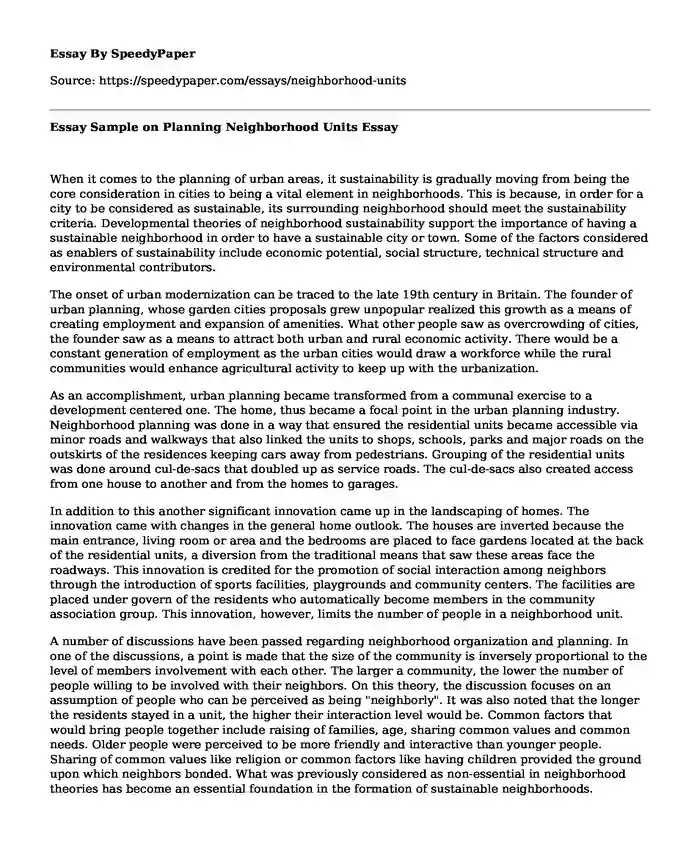
| Type of paper: | Essay |
| Categories: | Environment Architecture |
| Pages: | 3 |
| Wordcount: | 563 words |
When it comes to the planning of urban areas, it sustainability is gradually moving from being the core consideration in cities to being a vital element in neighborhoods. This is because, in order for a city to be considered as sustainable, its surrounding neighborhood should meet the sustainability criteria. Developmental theories of neighborhood sustainability support the importance of having a sustainable neighborhood in order to have a sustainable city or town. Some of the factors considered as enablers of sustainability include economic potential, social structure, technical structure and environmental contributors.
The onset of urban modernization can be traced to the late 19th century in Britain. The founder of urban planning, whose garden cities proposals grew unpopular realized this growth as a means of creating employment and expansion of amenities. What other people saw as overcrowding of cities, the founder saw as a means to attract both urban and rural economic activity. There would be a constant generation of employment as the urban cities would draw a workforce while the rural communities would enhance agricultural activity to keep up with the urbanization.
As an accomplishment, urban planning became transformed from a communal exercise to a development centered one. The home, thus became a focal point in the urban planning industry. Neighborhood planning was done in a way that ensured the residential units became accessible via minor roads and walkways that also linked the units to shops, schools, parks and major roads on the outskirts of the residences keeping cars away from pedestrians. Grouping of the residential units was done around cul-de-sacs that doubled up as service roads. The cul-de-sacs also created access from one house to another and from the homes to garages.
In addition to this another significant innovation came up in the landscaping of homes. The innovation came with changes in the general home outlook. The houses are inverted because the main entrance, living room or area and the bedrooms are placed to face gardens located at the back of the residential units, a diversion from the traditional means that saw these areas face the roadways. This innovation is credited for the promotion of social interaction among neighbors through the introduction of sports facilities, playgrounds and community centers. The facilities are placed under govern of the residents who automatically become members in the community association group. This innovation, however, limits the number of people in a neighborhood unit.
A number of discussions have been passed regarding neighborhood organization and planning. In one of the discussions, a point is made that the size of the community is inversely proportional to the level of members involvement with each other. The larger a community, the lower the number of people willing to be involved with their neighbors. On this theory, the discussion focuses on an assumption of people who can be perceived as being "neighborly". It was also noted that the longer the residents stayed in a unit, the higher their interaction level would be. Common factors that would bring people together include raising of families, age, sharing common values and common needs. Older people were perceived to be more friendly and interactive than younger people. Sharing of common values like religion or common factors like having children provided the ground upon which neighbors bonded. What was previously considered as non-essential in neighborhood theories has become an essential foundation in the formation of sustainable neighborhoods.
Cite this page
Essay Sample on Planning Neighborhood Units. (2019, May 15). Retrieved from https://speedypaper.com/essays/neighborhood-units
Request Removal
If you are the original author of this essay and no longer wish to have it published on the SpeedyPaper website, please click below to request its removal:
- Meaningful Relationship Essay Sample
- Free Essay on Movie Summary (October Sky)
- Conspirator - Movie Review Essay Example
- Essay Sample for You: Gun Control in America
- Essay Sample Dedicated to Handel's Messiah Hallelujah Chorus
- Recruiting Minorities for Police Force: A Historical Perspective. Paper Example
- Essay Sample on Personal Philosophy of Nursing and Application of Nursing Theory
Popular categories




